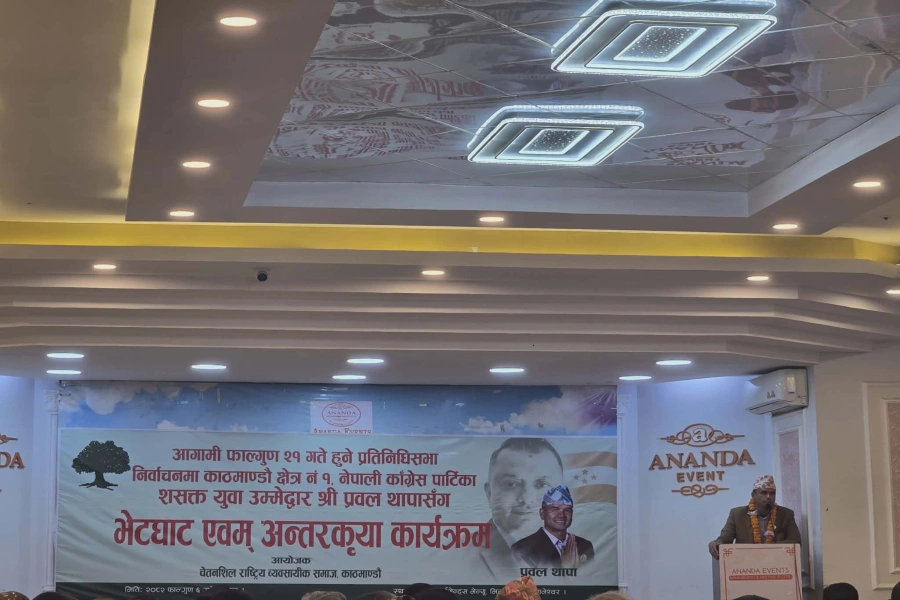Nepal stands at a crucial crossroads, grappling with an issue that demands both immediate and nuanced action
In Greek mythology, Medusa once danced as a beautiful mortal woman, only to be cursed by Goddess Athena for her transgressions.After that, Medusa became a symbol of enchantment and terror transformed into a creature of nightmares, with serpents for hair and a gaze that turned flesh to stone.
In the dimly lit glow of our digital screens, we find ourselves entangled in a digital web, much like the victims of mythical Medusa, who were turned to stone upon gazing into her eyes. Today's Medusa is not a myth but a pervasive presence: the internet. This Techno-Medusa captivates people with endless streams of information, entertainment, and social interaction, while simultaneously entrapping us in a cycle of addiction and government surveillance.
Nepal stands at a crucial crossroads, grappling with an issue that demands both immediate and nuanced action. Yet, the response from Parliament is often marked by indecision, as if the complexities of the digital age are beyond their comprehension. Compounding the problem, the cabinet’s default solution tends to be the most simplistic: an outright ban. This approach raises a pressing question about the current government's mindset: Can Nepal’s people truly thrive in a technological world, or are they doomed to be left behind.
The Enchantment of the Techno-Medusa
In Greek mythology, Medusa once danced as a beautiful mortal woman, only to be cursed by Goddess Athena for her transgressions.After that, Medusa became a symbol of enchantment and terror transformed into a creature of nightmares, with serpents for hair and a gaze that turned flesh to stone.
The Techno-Medusa casts a similar spell. Social media platforms like Facebook, Instagram, and TikTok, meticulously crafted to hold our gaze, offer endless novelty and instant gratification. This phenomenon, known as 'techno-enchantment,' goes beyond mere utility, weaving itself into the very fabric of our daily lives, transforming technology into a creative outlet.
Celebrities, models, actors, and influencers, with their striking beauty, personality, and curated lives, wield a digital allure that captures hearts and minds on Instagram and TikTok. They contribute to shaping trends, influencing public opinion, and defining cultural norms. Much like the gaze of Medusa, they mesmerize and ensnare, their digital charm leaving a lasting imprint on our consciousness. They are the fusion of contemporary aesthetics and ancient allure, spinning tales of fascination garnering millions of likes and shares.
R. Kelly convicted of child porn, enticing girls for sex

The Trap
Internet addiction, once a whisper on the fringes of psychological discourse, now stands stark and undeniable, casting long shadows over our modern lives. The World Health Organization (WHO), has acknowledged this addiction as a legitimate mental health condition, underlining its profound impact on our fractured world.
In a landmark move, 41 states in the USA and the District of Columbia filed a lawsuit against Meta, the behemoth behind Facebook and Instagram.The accusation is stark: Meta, driven by insatiable greed, has crafted its platforms to ensnare children, making them compulsively usable. The lawsuit contends that beneath the sleek interfaces and the endless scroll lies a calculated motive—profit at any cost. Sophisticated technologies, the dark wizards of the digital realm, captivate and ultimately entrap youth and teens. Research lends weight to these claims, revealing the almost magnetic allure of social media, a force that pulls young minds into its vortex, minds still tender and unformed, and their defenses weak against the onslaught of temptation and impulse.
In South Korea, one of the most digitized countries in the world, the echoes of digital addiction reverberate with alarming intensity. The government, in a bid to stem the tide, has established rehabilitation centers, sanctuaries for digital detoxification. The government implemented stringent measures to curb internet addiction after a South Korean couple, lost in the labyrinth of an online game, neglected their infant daughter, leading to her tragic death. This harrowing tale stands as a somber testament to the devastating consequences of unchecked digital immersion, a poignant reminder of the fragile line between the virtual and the real. It underscores the urgent need for awareness, intervention, and a collective reckoning with this pressing societal challenge.Nepal urgently needs to address this issue, yet the parliamentary discussions remain disappointingly trivial.
The All-Seeing Eye
While we marvel at the beguiling allure of the Techno-Medusa, we must also reckon with the relentless gaze of governmental surveillance and corporate manipulation. Tech giants, with precision, harvest, analyze, and monetize our personal data. Companies like Google, Facebook, and Amazon, those omnipresent sentinels, amass vast troves of information on our online behavior, preferences, and interactions to construct intricate profiles that fuel targeted advertising and subtly influence our actions, weaving an invisible web of control.
The Cambridge Analytica scandal remains fresh in our minds, serving as a stark illustration of the ominous power of surveillance.This data analytics firm, like a thief in the digital night, illicitly harvested personal data from millions of unsuspecting Facebook users. They wielded this stolen knowledge to sway political campaigns, including the pivotal 2016 U.S. presidential election. This flagrant breach of privacy laid bare the vulnerabilities lurking in our digital ecosystem, revealing the potential for manipulation and control through unchecked access to personal information.
Government surveillance involves the monitoring of individuals, groups, or the general populace by government agencies, often to collect information and ensure national security.For example, in Ethiopia, the government has been known to use sophisticated surveillance technology to monitor political opposition, journalists, and activists. Reports have highlighted the use of spyware to infiltrate computers and smartphones, enabling authorities to track communications, access sensitive information, and stifle political opposition. This type of surveillance not only infringes on individual privacy but also undermines democratic processes and human rights, creating a climate of fear and repression.
Surveillance and Free Will
The entwined threads of internet addiction and government surveillance create profound philosophical dilemmas. In this world of endless clicks and scrolls, people are both the watchers and the watched. The autonomy, once as vibrant as the wings of a dragonfly, now mirrors the petrifying stare of Medusa, turning our digital selves into statues immobile under the gaze of the screen.The internet, with its beguiling charm, lures us into its embrace, yet few pause to ponder the vast, invisible tendrils of government surveillance that coil tighter with every heartbeat, every breath, every moment of our online lives.
Understanding Data Sovereignty for the Parliament
In the swirling vortex of our modern age, the intertwined threads of internet addiction and government surveillance weave complications, posing grave questions about free will and autonomy.Michel Foucault's chilling vision of the panopticon—a prison where a lone guard observes unseen—has evolved into a potent metaphor for our times. We play dual roles, both the watchers and the watched, caught in a relentless system that monitors and records our every move.
While the internet's allure captivates many, the pervasive reach of government surveillance remains a shadowy secret, unacknowledged by most.Estonia, with its groundbreaking "data embassies"—encrypted data vaults scattered across secure global locations—pioneers a model for safeguarding data sovereignty and fortifying against cyber threats, all while upholding individual privacy.
Nepal, navigating digital governance challenges, stands at a crossroads. The path forward demands the establishment of a robust policy framework for data protection and privacy, harmonized with international standards like the General Data Protection Regulation (GDPR) of Europe designed to ensure reliable data management, fostering trust among all stakeholders.
Investing in secure infrastructure, from advanced data storage to robust cybersecurity, forms another critical pillar. These measures shield sensitive information from cyber threats, preserving its integrity and security. Equally essential are public awareness campaigns. Educating citizens about their data rights and responsibilities nurtures a culture of informed consent and trust in digital services, vital for a resilient digital ecosystem.
By following Estonia's innovative lead on data embassies, Nepal can forge a resilient digital infrastructure. This foundation will not only protect citizen privacy but also spur innovation and economic growth, improving its image from an authoritarian democracy to a country committed to responsible digital governance.This transformation holds the key to Nepal's journey toward true democracy.
Harmonious Digital Existence
In the seductive glow of our digital devices, where every click and scroll pulls us deeper into an endless labyrinth, the Techno-Medusa lurks. To transition to an era where everyone is connected to the internet and every whisper and heartbeat is captured, New York University professor Francesca Ferrando, who coined the term ‘Techno- Medusa,’ argues that we must recognize the multifaceted nature of our relationship with technology.To counter the effects of the Techno-Medusa, Ferrando advocates shedding the outdated mindset of the 20th century. Beyond addressing this issue, she emphasizes the need to recognize that technologies are not isolated entities but coevolving phenomena with shared existential awareness alongside humans.
This perspective reframes technology from a dominating force to a collaborative partner, a crucial shift. The remedy for techno-enchantment lies within us: by adjusting our habits and safeguarding ecosystems, we reclaim agency and foster a harmonious coexistence with technology. Additionally, we must move beyond viewing technology solely as a tool for human benefit. It's crucial to recognize its potential for broader existential and planetary good, appreciating its original and unique contributions that extend beyond anthropocentric purposes.
The prospect of AI entities gaining citizenship akin to humans is on the horizon, marking a pivotal moment in our relationship with technology. This development compels us to delve into the essence of humanity's coexistence with the sentient machines we've created, igniting profound questions about ethics, identity, and the future of society.
Legislative Action and Ethical AI Oversight
To tackle these modern-day challenges, Nepal must adopt a strategy that balances technological advancement with individual well-being and privacy. This includes enacting legislative reforms inspired by international standards like the GDPR to ensure robust data protection and privacy safeguards. Public education campaigns are essential to inform citizens about the risks of internet addiction and the importance of data privacy, particularly targeting vulnerable youth. Establishing digital detoxification centers, modeled after successful programs in South Korea, can provide counseling and rehabilitation for those struggling with digital addiction. Investment in secure technological infrastructure, similar to Estonia's "data embassies," will protect sensitive information from cyber threats. Furthermore, as AI becomes more prominent, it is crucial for Parliament to take a leadership role in fostering ethical discussions and establishing guidelines to navigate the relationship between humans and AI. Unfortunately, none of these critical issues have been addressed in Parliament, leaving the youth feeling as though they are living in the 20th century.







































